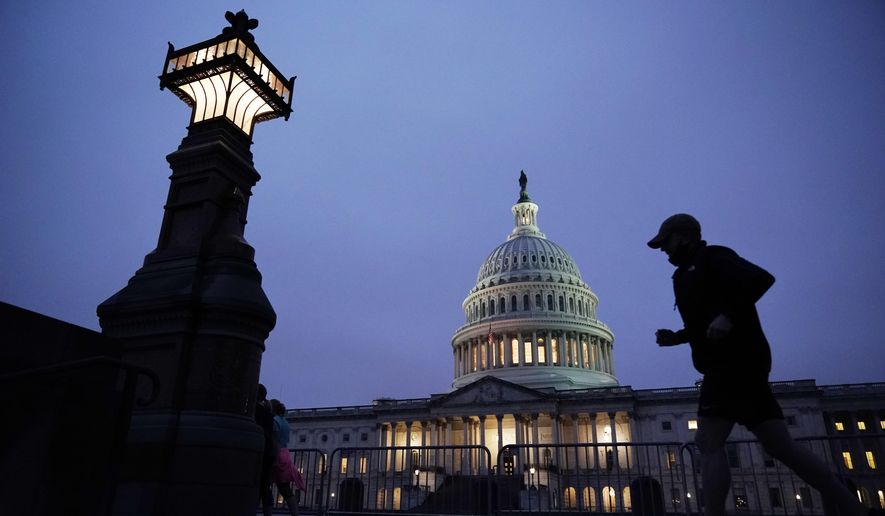Progressive advocates are urging Senate Democrats to add seats to lower federal courts in addition to the Supreme Court, a move that would enable President Biden to appoint hundreds more liberal jurists.
Samuel Moyn, a law professor at Yale University, and Aaron Belkin, director of the progressive Take Back The Court, on Wednesday called on Senate Majority Leader Charles E. Schumer of New York, Democratic whip Sen. Richard Durbin of Illinois, and Sen. Bernard Sanders of Vermont to add 250 seats to district and circuit courts across the country. None of the senators returned a request for comment from The Washington Times about the idea.
The liberal advocates argue the expansion for lower courts can be done with a simple majority vote, side-stepping the upper chamber’s 60-vote threshold to pass legislation, under so-called budget “reconciliation” rules. With a 50-50 Senate, Vice President Kamala Harris would serve as the tiebreaker.
“A measure expanding lower federal courts by 250 judges can be enacted through the budget reconciliation process, which is not subject to the filibuster, and which needs only a simple 51-vote majority to pass the Senate,” Mr. Moyn and Mr. Belkin said in a joint statement.
The pressure comes as progressives have also pushed for expanding the high court to counter the 6-3 conservative majority. But liberal Supreme Court Justice Stephen G. Breyer poured cold water on that call Tuesday, saying it would make the court appear political.
The activists said lower courts face a backlog of cases, pointing to Arkansas Eastern District Judge Brian S. Miller, a Republican appointee, who said the “increasing caseloads lead to significant delays in the consideration of cases, especially civil cases which may take years to get to trial.”
Liberals see creating hundreds of vacancies for Mr. Biden as a way to counter the record number of federal judicial appointments made by former President Donald Trump during the last four years.
They blame Senate Minority Leader Mitch McConnell, who held the GOP majority in the upper chamber from 2014 to 2021, for obstructing former President Barack Obama’s judicial appointments during his final two years in office. They said that obstruction created vacancies for Mr. Trump, who went on to appoint 174 district court nominees, 54 circuit court appointments and three Supreme Court justices.
Mr. Trump came into office with 112 federal judicial vacancies to fill. With the help of Senate Republicans, he filled most of the seats and gave the judiciary a conservative bent.
By contrast, Mr. Obama had 53 vacancies when he entered office in 2009, and President George W. Bush had 80. Mr. Biden had 57 openings to fill as of February.
“Lower federal courts are in desperate need of expansion, and this can clearly be accomplished via budget reconciliation,” Mr. Belkin said. “If Democrats are unwilling or unable to accomplish this urgent reform via reconciliation, the only option remaining to get this done is to abolish the filibuster. We can’t let a Jim Crow era procedural hurdle like the Senate filibuster hinder democracy’s restoration.”
The call Wednesday to expand lower courts follows progressives’ push to add justices to the Supreme Court.
Several prominent Democrats, including Ms. Harris, called for expanding the high court beyond nine justices after Mr. Trump appointed three new justices to fill vacancies during his term. One of those seats was formerly held by a Democratic appointee, the late Justice Ruth Bader Ginsburg.
Transportation Secretary Pete Buttigieg, as a candidate during the Democratic primary, suggested as many as 15 new justices could be added to the high court.
But even Democratic appointees have batted down the idea.
The late Justice Ginsburg, a liberal icon, said “nine seems to be a good number” while Justice Breyer, a Clinton appointee, said this week that expanding the Supreme Court would be “eroding trust” and the Court’s influence.
In a speech at Harvard Law School, the Clinton appointee said that any move by Democrats to add justices to the high court would give the appearance of politics.
“Structural alteration motivated by the perception of political influence can only feed that perception, further eroding that trust,” Justice Breyer said, according to The Washington Post.
Aside from expanding the Supreme Court, progressives have also called for Justice Breyer to retire. He’s the oldest justice on the high court, at 82 years old.
Retirement announcements usually come at the end of the Court’s term, which typically ends in June, but Justice Breyer has not given any hint that he would be stepping down from his seat.
Conservative groups, meanwhile, welcomed his dismissal of calls to expand the high court.
“Justices Breyer and Ginsburg are among the most liberal members of the Supreme Court in U.S. history. Their courage in rejecting court packers’ political demands is a great service to the Constitution, to the federal judiciary and to the American people,” said Mike Davis, president of the Article III Project.
• Alex Swoyer can be reached at aswoyer@washingtontimes.com.




Please read our comment policy before commenting.